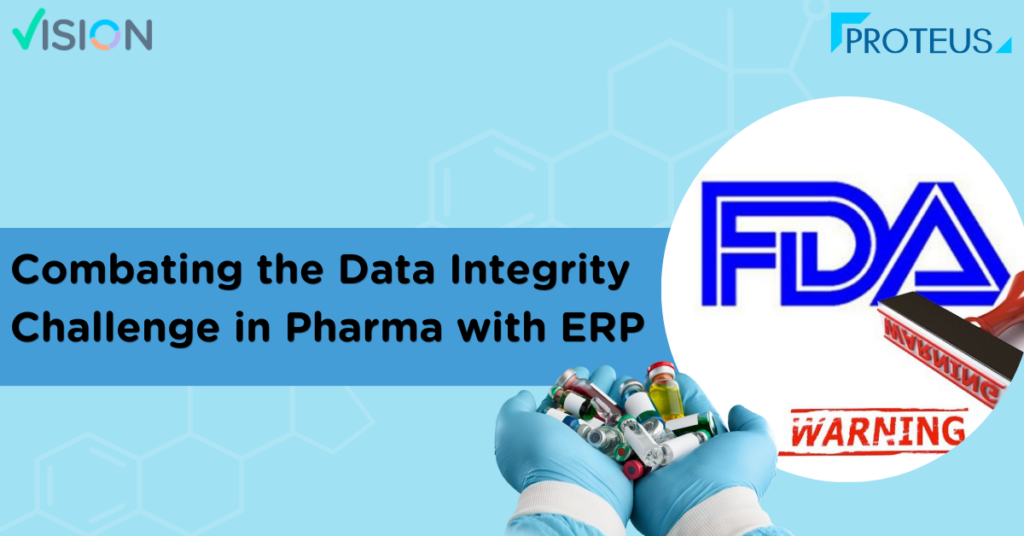
Data integrity, ensuring the accuracy and completeness of data throughout the manufacturing process, is a critical concern in the pharmaceutical industry. Regulatory bodies like the FDA have increasingly cited data integrity issues as the top non-compliance observation, highlighting the potential risks associated with compromised data. Ensuring the ALCOA+ (Attributable, Legible, Contemporaneous, Original, Accurate, Complete, Consistent, Enduring, and Available) principles are upheld throughout the manufacturing process is critical for patient safety, regulatory compliance, and brand reputation.
A recent statement by the USDFA Country Director, India Sarah McMullen highlights the problem.
Fortunately, advancements in technology offer promising solutions. Enterprise Resource Planning (ERP) systems and the principles of Pharma 4.0, a data-driven approach to pharmaceutical manufacturing, can significantly contribute to improved data integrity.
Maintaining data integrity in a complex environment like pharmaceutical manufacturing is challenging. Manual processes, paper-based records, and siloed systems are prone to errors and inconsistencies. Additionally, the pressure to meet tight deadlines and achieve desired outcomes can sometimes lead to manipulation or falsification of data. These issues have severe consequences. Compromised data integrity can:
Jeopardize product safety and efficacy: Inaccurate or incomplete data can lead to unforeseen issues during production, potentially compromising the quality and safety of drugs.
Hinder regulatory compliance: Regulatory bodies like the FDA require strict adherence to data integrity standards. Failure to comply can result in warnings, fines, and even product recalls.
Reputation: Breaches in data integrity can erode public trust in the pharmaceutical industry, impacting brand reputation and market access.
Solutions like Vision ERP designed for the Pharmaceutical industry emerge as a powerful tool for pharmaceutical manufacturers seeking to strengthen their data integrity practices. Here’s how Vision can contribute:
1. Streamlined Data Capture and Management: ERPs establish a centralized platform for collecting and managing all manufacturing data, from raw materials to finished products. This eliminates the need for disparate paper-based systems and manual data entry, reducing the risk of human error and inconsistencies.
2. Enhanced Data Traceability: Vision provides audit trails that track every step of the manufacturing process, including who made changes, when they were made, and why. This detailed record facilitates seamless investigations and ensures data can be readily retrieved for review.
3. Automated Workflows and Approvals: It can automate essential workflows, such as batch recording, equipment calibration, and change control procedures. This enforces pre-defined steps and eliminates the possibility of skipping crucial procedures or manipulating data.
4. Robust Access Control: Vision offers granular control over user access and permissions, ensuring only authorized personnel can access and modify data. This minimizes the risk of unauthorized alterations and protects data confidentiality.
5. Improved Data Security: Incorporates robust security features like role-based access control, data encryption, and activity logging to safeguard data against unauthorized access, cyber threats, and accidental deletion.
6. Real-time Data Visibility: Offer real-time insights into production processes, allowing for immediate identification and rectification of any potential data integrity issues. This proactive approach minimizes the risk of non-compliant products reaching the market.
7. Integration with machines: Vision is designed so that it can integrate directly with machines on the shop floor ensuring the the right parameters are provided for it to perform and the machine data is recorded without any human interface
8. Embracing Pharma 4.0: With a built-in AI engine and advanced data analytics along with machine integration, it is now possible to achieve the goals of Pharma 4.0 is to improve efficiency, productivity, and quality in the pharmaceutical industry. This is done by using real-time data to monitor and optimize manufacturing processes, predicting and preventing equipment failures.
If you are interested in learning more about Pharma 4.0, you can visit the website of the International Society for Pharmaceutical Engineering (ISPE), which has developed a Pharma 4.0 Operating Model.
While ERPs provide valuable tools, it is crucial to emphasize that technology alone cannot guarantee data integrity. A holistic approach that combines technological solutions with cultural shifts is essential:
Employee training: Regularly training employees on data integrity principles and best practices is crucial for fostering a culture of accountability and ethical behavior.
Management commitment: Strong leadership commitment to data integrity is essential for successful implementation and sustained compliance.
Continuous improvement: Regular audits and reviews of data management processes and procedures are necessary to identify and address any potential issues.
Implementing an ERP solution is not a silver bullet, but it serves as a powerful foundation for building a robust data integrity framework within pharmaceutical manufacturing. By embracing automation, access control, and real-time data visibility, ERPs empower manufacturers to reduce the risk of non-compliance, ensure patient safety, and build trust with regulatory bodies.
Nilay Sharma
Director at Proteus Technologies Pvt Ltd.